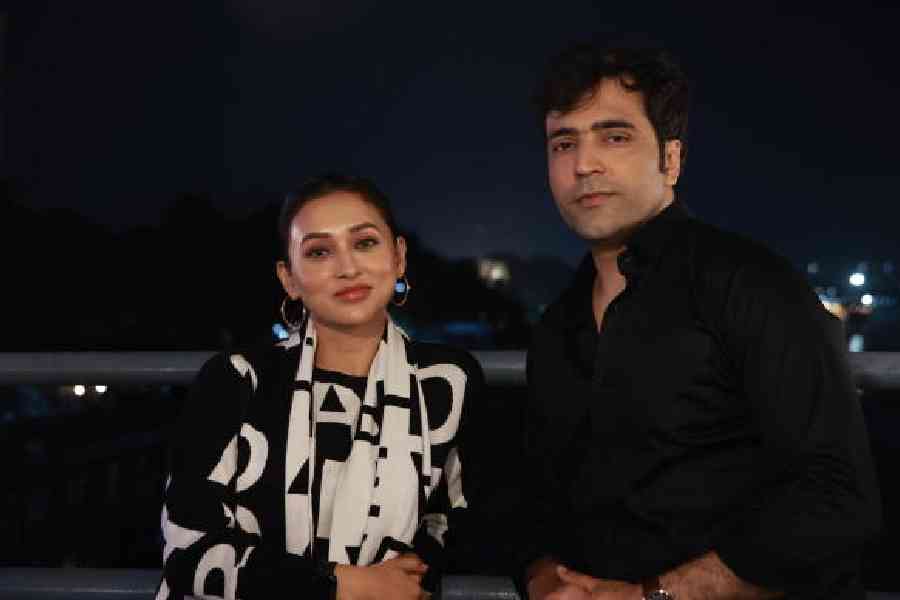The word ‘alaap’ in Bengali has many sides. It could be the first meeting or introduction between two people; or the initiation piece before a Hindustani raga; or a prelude to a relationship; or a preface that enables better understanding. Whatever be the case, DoP turned filmmaker Premendu Bikash Chaki’s recent release Alaap fits the bill. It gives the audience a glimpse into the world of romance today. For those who are always lamenting the fact that romance or pure love has disappeared and for the present generation mind over matter is extinct, Alaap will present a refreshing change of attitude.
The story developed by scriptwriter Padmanabha Dasgupta and the filmmaker Chaki (as he is better known amongst associates) has the Gen Z in their grip. The vocabulary, lifestyle, and attitudes that young men and women flaunt today have been portrayed with a mastery that calls for appreciation.
The casting too has a touch of class. Both Abir Chatterjee and Mimi Chakraborty paired together after their last film (Raktabeej), exude a chemistry that goes beyond a meeting or ‘alaap’. Abir’s characterisation of a suburban young man working nights at an IT company or Mimi’s portrayal of a spirited career-oriented young woman has the modern universal touch.
PB, in short, has managed to eke out sterling performances from his entire cast. Special mention has to be made of Rohit Gupta as Sukhlal, Bhadra Basu as the next-door neighbour and Tonni Laha Roy as the well-meaning friend and confidant. Swastika Dutta as the ‘other woman’ in a love triangle, where two arms do not meet till the last 15 minutes of the film, has eyes that speak volumes.
Abir Chatterjee’s use of blinking eyes and the almost involuntary facial tick enhances his characterisation of a man who keeps awake at night. After all, he is the owl! To his owl, Mimi plays a bird that chirps all day long. Her energy in characterising the professionalism of an upwardly mobile girl displays the right degree of charm and aggressiveness. Romance makes a dent but Mimi as Aditi bounces back.
The extensive use of sticky notes once again proves life is not totally virtual! The lonely goldfish in the bowl or the flowering cactus epitomises the world of love today. The high point of the film remains in maintaining close proximity between two people yet keeping them from meeting physically.
Even though the two protagonists do not meet, they develop a kind of friendship and tenderness for each other through the sense of smell and almost neo-virtual presence. The very concept is contemporary and the filmmaker has delved deep into the mindset and lifestyle of the Gen Z.
However, a small logical digression on this otherwise flawless entertainer is making Mimi (Aditi Mitra) sport a tiny ‘bindi’ with totally Western clothes in the sequence when she steps into a new apartment. A question arises, why was this wrong style statement sported only in this one scene? Realisation dawned when the flatmate’s parents arrived at the apartment. This was perhaps to justify the discovery of a bindi, a telltale sign for the mom to hit upon and suspect that her son was in an illicit secret relationship. The ‘bindi’ could have been avoided.
The production design is rich. Both Dhananjoy Mondal the production designer and DoP Anirban Chatterjee have worked in tandem to create a world that the young aspire for. More than the songs created by Anupam Roy, what strikes a chord in the film is Prabuddha Banerjee’s background score and the use of a Rabindrasangeet Sajani sajani at the right moment sung with the correct degree of empathy by Chandrika Bhattacharya. This song elevates the end. The editor too deserves a pat on the back for his restrain and allowances.
The film concludes with a short story-esque finish, leaving the audience satiated yet tinged by a certain feeling: if only…
While reading Tagore’s Shesher Kobita, the reader gets entrenched in Labonnyo and Amit’s love affair. Similarly while watching Aditi and Pablo the audience gets entrenched in their lives and relationship and the end evokes the same déjà vu as Tagore’s story does. Premendu Bikash Chaki take a bow!










